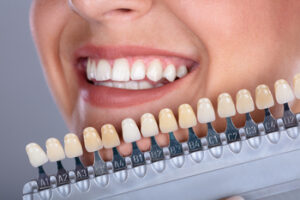Many people consider dental veneers, specifically porcelain veneers, a viable option for correcting cosmetic flaws such as crooked or misshapen teeth, chipped or broken teeth, and discolouration. However, there are misconceptions that dental veneers can ruin natural teeth, leading to dental problems such as tooth decay or gum disease. So, the question remains- are veneers bad for your teeth? This blog post will provide all the essential information you need to make the right decision when contemplating cosmetic dentistry treatments.
What Are Veneers?
Veneers are custom-made pieces of material that are made to look like natural teeth. Their primary purpose is to improve the overall look of teeth, typically by covering cosmetic flaws such as chipped, misshapen, or discoloured teeth, and even to address minor dental problems. They involve removing a thin layer of enamel off the tooth surface and then applying a veneer that is coloured and shaped to match your natural teeth to create your desired smile.
Materials Used to Make Veneers
There are two primary materials used when making veneers: porcelain and composite. Porcelain is the more traditional and higher-end material used in veneers, known for its durability, and can last up to 15 years with proper care.
 Composite veneers, on the other hand, are made of resin material and are more affordable but less durable. These veneers typically last between five to seven years with proper care. There are different types of veneers, each with unique features and advantages.
Composite veneers, on the other hand, are made of resin material and are more affordable but less durable. These veneers typically last between five to seven years with proper care. There are different types of veneers, each with unique features and advantages.
The traditional porcelain veneers, as mentioned earlier, are made of high-quality materials and can last for over a decade.
Composite veneers are more affordable but will eventually need to be replaced due to wear and tear much sooner than porcelain.
Temporary veneers are a great option for those that want to see what their veneers will look like before committing.
The Benefits of Veneers
Enhancing the Appearance of Teeth
Veneers are a popular cosmetic dentistry treatment that involves placing a thin layer of bonding material over the surface of your existing teeth. This thin layer of porcelain or composite veneers can reshape your teeth, close gaps, and create an even, symmetrical smile. Veneers are tailored to your preferences, enabling you to achieve your dream smile without major surgery or complicated procedures.
Correcting Dental Imperfections
Veneers can also correct dental problems such as chipped or broken teeth, misshapen teeth, crooked teeth, and discoloured teeth. Veneers can cover up these imperfections and give you a picture-perfect smile with no noticeable damage or signs of wear and tear. This is particularly important for dental flaws that cannot be corrected with traditional cosmetic treatments such as teeth whitening.
Improving Self-Esteem
Many people are self-conscious about their teeth and unsure about smiling or speaking in public. Veneers can help you regain confidence and feel better by completely transforming your smile. Once you have veneers, you can smile, laugh, and speak confidently, knowing you have a perfect set of teeth that looks natural.
The Potential Negative Effects of Veneers
A. Sensitivity
One of the potential negative effects of veneers is increased tooth sensitivity. This is because the veneers involve the removal of a thin layer of enamel from the tooth surface to make room for the bonding material. This removal can expose the dentin layer of the tooth, which contains sensitive nerve endings. If you already have sharp teeth or your enamel is naturally thin, veneers can exacerbate this issue.
B. Damage to Tooth Enamel
Removing the thin enamel layer can also have a more long-term negative effect on the teeth. Enamel is an important protective layer that helps prevent tooth decay and other dental problems. Once it’s gone, it can’t be replaced naturally. Over time, this can make weakened teeth more susceptible to damage and decay.
 C. Potential Placement Issues
C. Potential Placement Issues
Another potential issue with veneers is the placement process itself. Veneers need to be placed carefully and precisely to ensure they look natural and function properly. If they aren’t set correctly, they can cause problems with bite alignment and overall tooth function.
Additionally, if the natural teeth aren’t properly prepared before veneer placement, it can lead to problems.
D. Limited Lifespan
Veneers are not a permanent solution and will need to be replaced eventually. Traditional porcelain veneers can last 10 to 15 years, while composite veneers may only last 5 to 7 years. This means that you may need to invest in additional cosmetic dentistry treatments to maintain your dream smile over time.
E. Expenses Involved with Veneer Replacement
Finally, the cost of veneer replacement is another potentially negative effect. Veneers can be expensive, and replacing them can be even more so. This is why taking good care of your veneers and natural teeth is crucial to extend their lifespan as much as possible.
Who Is a Good Candidate for Veneers?
A. Factors That Influence Veneers Suitability
Veneers are a cosmetic treatment that involves attaching a thin layer of porcelain or composite bonding material to your tooth surface. This procedure can fix cosmetic flaws, such as misshapen teeth, chipped or broken teeth, and crooked teeth. However, to be a good candidate for veneers, you should have healthy teeth and gums with no signs of decay or gum disease. Veneers are not recommended for people with serious dental problems that require treatment, such as a dental crown or root canal.
The condition of your natural enamel is also a crucial factor that influences the suitability of veneers. Unlike teeth whitening, which brightens your natural enamel, veneers replace your natural enamel with a dental material. Therefore, you need enough natural enamel to attach veneers without damaging your tooth structure. Your cosmetic dentist will evaluate the thickness and quality of your enamel to determine if veneers are a good fit for your teeth.
B. Discussion on Whether Veneers are the Best Option for Individuals
Although veneers are a popular cosmetic treatment, some have better options. Dental bonding may be more cost-effective and less invasive if you have minor cosmetic flaws, such as slight discolouration or small chips.
 Dental bonding is a process that involves applying resin to your natural teeth and shaping it to look like your tooth’s natural shape.
Dental bonding is a process that involves applying resin to your natural teeth and shaping it to look like your tooth’s natural shape.
On the other hand, if you have severe cosmetic flaws that require extensive reshaping, traditional porcelain veneers may be a better option.
Traditional veneers are custom-made shells that cover the front surface of your teeth, often requiring more significant preparation than composite veneers.
However, traditional veneers are more durable and long-lasting than composite veneers, making them a better investment in the long run.
Care and Maintenance of Veneers
A. Oral Hygiene
Maintaining good oral hygiene is critical for your veneers’ longevity and natural teeth. Brushing and flossing your teeth twice daily and using mouthwash to prevent gum disease and plaque buildup is essential. Use a soft-bristled toothbrush to avoid scratching the veneer’s surface or damaging the bonding material. Avoid using abrasive and whitening toothpaste as it can damage the natural enamel and the veneers. Regular check-ups with your cosmetic dentist for dental cleanings and examinations are recommended.
B. Dietary Considerations
Your dietary habits are vital in maintaining your veneers’ quality and appearance. Avoid excessive stain-inducing foods and beverages such as coffee, wine, berries, and soy sauce. Acidic foods and beverages such as citrus fruits, tomatoes, and carbonated drinks can cause erosion of your natural enamel, which may predispose your veneers to damage. It is also essential to avoid biting into hard foods such as ice or nuts, which can crack or chip the veneers. A mouthguard can protect your teeth and veneers if you cannot resist indulging in these foods.
 C. Follow-up Appointments
C. Follow-up Appointments
Regular follow-up appointments with your cosmetic dentist are crucial to ensure your veneers are in good condition.
During these appointments, your dentist will evaluate the veneers’ fit, function, and appearance and perform any necessary adjustments, such as polishing or replacing the veneers. These appointments also allow your dentist to identify and treat any dental problems, such as gum disease, tooth decay, or broken teeth, which may affect the quality of your dental treatment.
D. Post-treatment Care Instructions
Your cosmetic dentist will provide post-treatment care instructions to help you maintain the quality of your veneers. These may include wearing a temporary veneer to protect your natural teeth during placement, avoiding eating or drinking anything for a specific period after the veneers are placed, and using a mouthguard to protect your veneers during sports activities. Your cosmetic dentist may also prescribe pain medication to manage mild discomfort after the procedure.
Conclusion
In conclusion, dental veneers are a popular cosmetic treatment for those looking for that dream smile. Traditional porcelain veneers are long-lasting and effective in hiding cosmetic flaws such as chipped, misshapen or crooked teeth. However, veneers require proper care and attention to avoid dental problems such as gum disease and damage to the natural enamel. The thin layer of enamel removed during the veneer process cannot be restored and may lead to tooth decay if not properly cared for. Proper research and consultation with a professional cosmetic dentist are key to avoiding further damage with composite or temporary veneers. In conclusion, while veneers may seem like a quick fix, it is important to consider the potential risks carefully and take preventative measures when maintaining the tooth surface after cosmetic treatments such as veneers or dental crowns. Further information on veneer care and maintenance can be found through reputable cosmetic dentists or dental associations. Contact us now on (02) 8806 3799 to make your first appointment!
References
A systematic review and meta-analysis of the survival of non-feldspathic porcelain veneers over 5 and 10 years
https://pubmed.ncbi.nlm.nih.gov/23476903/
Porcelain for veneers
https://pubmed.ncbi.nlm.nih.gov/9893514/
Veneers
https://www.healthdirect.gov.au/veneers










